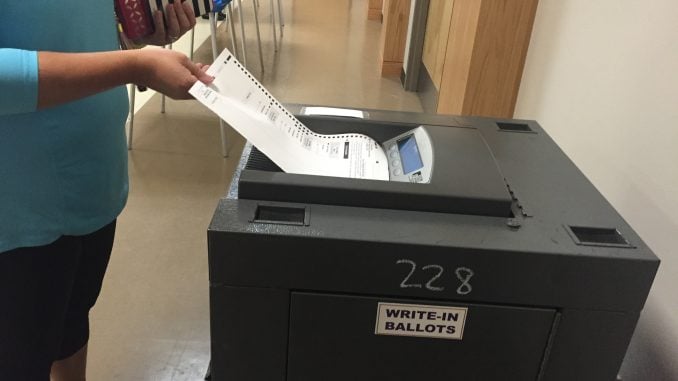
RALEIGH — The state House of Representatives gave final legislative approval Tuesday to a proposed constitutional amendment that would expand the rights of victims of crime and their families in the North Carolina justice system. Approved 107-9, the amendment would expand the offenses that trigger victims rights protections. N.C. voters ould give final approval on November ballots
The measure is just one of a number of constitutional amendments that the North Carolina General Assembly is considering. Any amendment to the state’s constitution must be approved by voters.
Democratic leaders argue that Republicans are using constitutional amendments as an election tactic to protect their legislative supermajorities. Ballot initiatives, like constitutional amendments, can be used to drive votes by motivating supporters to turn out and help their passage.
This year could see up to six constitutional amendments on the ballot.
S.B. 75 — “Const. Amd. – Max. Income Tax Rate of 5.5%” was passed by the Senate in March 2017, 36-13, and after passing through the House Rules Committee last week, is calendared for a final vote this week. The bill, if passed then approved by voters, would reduce the income tax cap from 10 percent to 5.5 percent, slightly higher than its current rate of 5.499 percent.
H.B. 551 — “Strengthening Victims’ Rights” provides victims of crimes a number of enshrined rights. These would include the right to speak at the accused’s trials, notice of the accused’s trial updates and safety from them in the future. On Monday, a committee substitute passed through the Senate Judiciary and Rules committees before being passed by the full Senate 45-1. The House has the bill scheduled for a vote this week.
S.B. 677 — “Protect Right to Hunt and Fish” was filed in early June of this year and two weeks later passed the Senate with a vote of 44-4. On June 25, the House passed an amended version of the bill, and the Senate concurred with the changes later in the day, making it law. The amendment, if passed by the voters, would make hunting and fishing a right and, in many cases, would prevent laws restricting it unless environmental damage could be shown as a risk.
“These rights are deeply rooted in the culture of North Carolina and that is what this amendment recognizes. We are confident that voters will agree,” said the bill’s primary sponsors, Sens. Danny Britt (R-Robeson), Norman Sanderson (R-Pamlico) and Tom McInnis (R-Richmond), in a joint statement.
Many members described hunting and fishing as a “heritage” in North Carolina before bipartisan votes of 92-23 in the House and 41-6 in the Senate.
H.B. 1092 — “Const. Amendment – Require Photo ID to Vote” may be the most controversial of the lot. The bill is worded to give voters the say in whether there will be voter identification requirements, but then the actual details of those will be worked out afterward by the legislature. Filed on June 7 and approved by the House Rules Committee, H.B. 1092 was then voted through on Tuesday by a vote of 74-43 after two days of debate. The Senate is expected to pass the bill this week as well.
“The voters of North Carolina deserve a chance to weigh-in on securing their own rights in the democratic process and will have the final say on strengthening election protections,” said Speaker Tim Moore (R-Kings Mountain) in a press release.
S.B. 814 — “Judicial Vacancy Sunshine Amendment” was filed last week and then sent to the Senate Judiciary Committee, where an amended version passed through to the Senate Rules Committee, which also then passed this version. The full Senate then passed the committee substitute 36-13 and sent it on to the House. Rather than have the governor replace vacant judicial seats, the bill suggests an open nomination process, with a nonpartisan commission approving or disapproving the nominees based on merit. The General Assembly would then send two of these names to the governor to choose from.
H.B. 913 — “Bipartisan Ethics and Elections Enforcement” was announced as a draft last Friday and has already moved through committees and onto the House floor, where it received a 74-44 vote. It will now be taken up by the Senate Elections Committee. The constitutional amendment would create a bipartisan ethics and elections board and adjust the way some positions are appointed, shifting some powers away from the executive branch.
All of the proposed constitutional amendments described in these bills would only take effect if approved by voters in November. The voter ID bill has received the most media attention, in part because of a nationwide discussion on implementing the measures. Those on the left often accuse supporters of voter ID laws of packing black voters in fewer districts, while those on the right tend to see this as a way to protect voting integrity.
Thirty-four states already have some level of voter ID requirement, including all but N.C. in the South. A poll last week from SurveyUSA and the Civitas Institute found that voter ID has support from 69 percent of N.C. voters, while 24 percent oppose it, and 7 percent are unsure.

